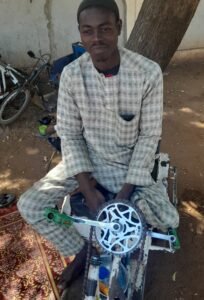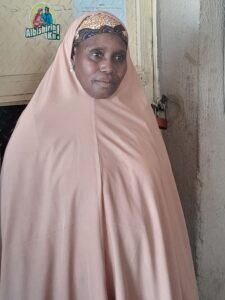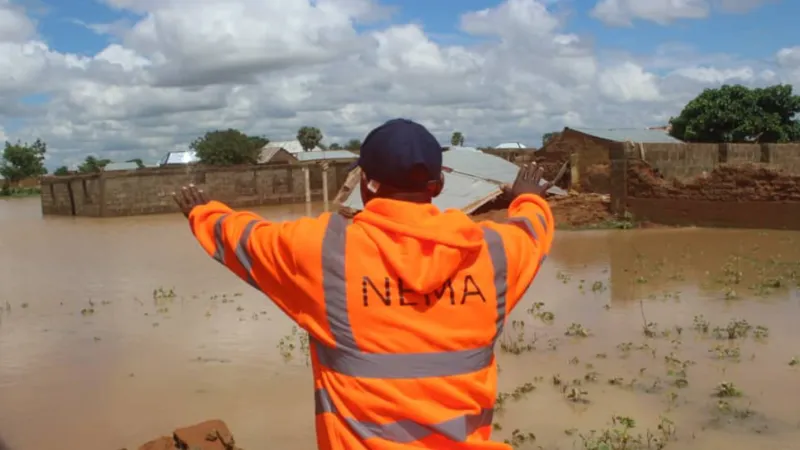In this report, Gom Mirian delves into the impact of zero immunisation on the lives of children and shares their experiences through the eyes of a resilient 17-year-old, Shaudy Adamu, who is determined to ensure that no child gets to live with the consequences of grave negligence that has altered his life’s course.
Sokoto State is a land acclaimed for its rich culture and vibrant traditions, but behind its captivating facade, a severe crisis looms. With a staggering population of over 6.4 million, it holds the record for the state that has the highest number of zero-dose immunised children in the country, thereby putting the lives of its youngest citizens at grave risk.
Avoidable burden – The Tragic Adamu Case
Adamu is a poster child for Sokoto’s performance, a proof of the unforgiving consequence of zero immunisation. He lives painfully crippled by polio, a daily reminder of a neglected dose. The bright-eyed teenager shares a youthful smile while chatting with African Health Report (AHR) in his neighborhood.
“I wasn’t born like this,” he declared, with sadness clouding his earlier twinkling eyes. “It all began when I was about to walk. My parents told me that when they were helping me learn how to walk as a baby, I fell and started crying. My mother was confused and rushed me to the hospital, thinking it was just out of pain. But the doctor noticed that one of my legs was bigger than the other, and after some time, it was diagnosed as polio. It was already too late for vaccination.

(Photo credit: Gom Mirian/AHR)
“I felt so bad and devastated when I learned that my condition could have been avoided. If only I had received the polio vaccine on time, my life would have been completely different. I wouldn’t have to struggle with mobility issues every day, facing the stigma and challenges that come with it. It’s a constant reminder of what could have been,” Adamu added regrettably.
Adamu’s story is a poignant reminder of the importance of timely immunisation. Despite all odds, Adamu’s spirit is not broken. He goes out to advocate for caregivers to ensure their wards do not suffer the consequences of preventable diseases. His words, “I go out weekly, telling parents about the importance of vaccinations. I always tell them, ‘don’t let your children be like me.”
This youngster is just one of the many children who missed out on life-saving immunisations. His is a story that resonates among countless other children in Sokoto State, highlighting the urgent need for a comprehensive immunisation campaign that can turn the tide of this crisis.
Sobering Statistics
Recent data released by Multiple Indicator Cluster Survey (MICS), National Immunisation Coverage Survey (NICS) and combined NPSIA reveals disturbing statistics – 51 percent, accounting for 122,015 children in Sokoto State, have not received even a single dose of vaccination, exposing them to life-threatening diseases. This paints a grim picture of the state’s healthcare infrastructure, socio-economic conditions, and challenges faced by its population.
Sokoto State, located in northwestern Nigeria, faces multifaceted challenges that contribute to the dire state of immunisation. The state’s vast rural areas with scattered settlements pose logistical challenges, making it difficult for healthcare workers to reach remote communities. Also, superstitions, misinformation, lack of awareness, and cultural beliefs surrounding immunisation have contributed to skepticism and hesitancy among some parents, leaving many children vulnerable to diseases that can be easily prevented
Despite efforts to improve healthcare services, the state lags behind national averages in child immunisation rates, creating a breeding ground for preventable diseases like polio, measles, hepatitis, tetanus, diphtheria, and tuberculosis. Poverty, low education levels, cultural practices, and inadequate healthcare access are also some of the hurdles that impede the progress of immunisation.
Vaccines – Shields Against Diseases
Vaccines, used for immunisation, serves as a powerful tool in preventing the outbreak and spread of infectious diseases. From polio and measles, to diphtheria and tetanus, vaccines have the remarkable ability to eradicate life-threatening illnesses that plague communities. For children under 5 years old, immunisation offers a protective shield, defending them against diseases that which could have had lifelong consequences on, or even ended their lives prematurely. By immunising children, they are shielded from harm, leading to the overall health and well-being of communities.

When a significant percentage of a population is immunised against a disease, it prevents the spread of infection and protects those who are not vaccinated against it, such as infants or individuals with weakened immune systems. This is called herd immunity. It is crucial in a society with irregular immunisation rates but Sokoto’s high number of unimmunised children means they and the entire community are at risk of diseases.
Factors Contributing to Low Immunisation Rates
Sokoto faces a complex web of challenges. Poverty acts as a formidable barrier, often preventing families from reaching healthcare centres or affording the cost of immunisation. Moreover, cultural beliefs, compounded by a lack of awareness and gender disparities, further contributes to the dire situation.
In Sokoto, a Health Specialist at the United Nations Children’s Fund (UNICEF) field office in Sokoto, Dr. Danjuma Nehemiah, recently spoke at a media dialogue on the Routine Immunisation (RI) and Zero-Dose Campaign, organised by the Sokoto State Primary Healthcare Development Agency, in collaboration with the organisation. He shed light on reasons why children are not fully vaccinated in the State. According to him, 30 percent of caregivers believed their children were fully immunised, 11 percent of mothers or caregivers were too busy, 11 percent feared side effects, and 7 percent found the immunisation site to be too far.
Inspiring hope – Government, UNICEF collaboration
In response to this disconcerting situation, Sokoto State government has partnered with UNICEF to launch various initiatives aimed at addressing the high number of zero-dose immunised children. These initiatives include vaccination campaigns, public awareness programmes, and the introduction of mobile clinics to overcome logistical challenges and reach remote communities.
Dr. Nehemiah explained in an interview with AHR, that the organisation is providing support to eight out of the thirteen (13) affected local government areas in the state. This support is intended to bridge the gap in hard-to-reach areas and dispel misconceptions about routine immunisation.
He said, “UNICEF is currently providing integrated outreach services in eight LGAs of Sokoto, namely Bodinga, Dange-Shuni, Shagari, Wammako, Sokoto South, Wurno, Kware and Gwadabawa. The organisation is also supporting these outreach services by providing stipends for logistics and transportation, daily allowances for team members, and mobile data for routine immunisation in hard-to-reach areas.
“In addition to routine immunisation, the outreach teams also screen children for malnutrition, provide referrals for treatment, conduct birth registration, and offer education referrals for children not attending school. UNICEF has also implemented the immunisation education integration project and continues to work on building the capacity of the state team to provide efficient services and manage vaccine distribution.
“To address non-compliance and misconceptions about routine immunisation, UNICEF has engaged socio-behavioural teams, facilitators, and voluntary mobilised groups to spread key messages in local communities. The organisation has also provided support to religious leaders in all LGAs to address religious beliefs concerning routine immunisation.
“Despite the progress made, UNICEF faces challenges related to security issues in reaching children in security-compromised areas. However, the organisation is working closely with war-prone communities and security agencies to overcome these challenges.
“While the current initiatives are not continuous due to funding constraints, UNICEF plans to conduct a final mop-up in areas where they believe more work is needed. The organisation is also encouraged by the support of other organisations in reaching the hard-to-reach areas of Sokoto.”
Unsung Heroes: Rising above the ashes
In Sokoto’s darkest hours, some individuals and grassroots organisations work assiduously to fan the flame of hope, trying tirelessly to reverse the declining immunisation rates. Community leaders like Hauwau S-yaki, the women leader of the Gagi Community, tirelessly use storytelling to educate others about the importance of immunisation, breaking barriers rooted in cultural beliefs. Mothers like Hauwau, who experienced the heartbreaking loss of a relative’s child due to a vaccine-preventable disease, channel their grief into advocacy, urging fellow parents to protect their children.

She said, ’’I organise weekly mobilisation of women, providing items such as soap, matches, and detergents to encourage mothers to bring their children for routine immunisation (RI). We educate them about the importance of RI and persuade them to bring their children for vaccinations.
‘’Despite the willingness of most women to bring their children for immunisation, some face resistance from their husbands due to ignorance and illiteracy. However, some of them discreetly arrange for other women to take their children for immunisation to avoid their husbands’ opposition.
“In certain cases, it is challenging to enter houses due to the presence of husbands. Nevertheless, despite these obstacles, every mother in the community ensured their children were immunized,’’ she narrated.
Similarly, the district head of Gagi, Alhaji Sani Umar, expressed commitment to vaccination advocacy, saying his community does not have cases of zero-dose immunisation due to his leadership example.

“The success in promoting immunisation was due to my passionate leadership style,” he happily said. “I consistently preach about the importance of immunisation and led by getting myself and my family vaccinated first. By doing so, I demonstrated to my followers that I was not just preaching but also practising what I advocated. As a result, my community members willingly participated in immunising their children, following my example.”
The Importance of Action
The consequences of Sokoto State’s immunisation crisis are far-reaching. Lives are lost, dreams are shattered, and the cycle of poverty perpetuates. Urgent action is needed to tackle this grave situation. Strengthening healthcare infrastructure, improving access to immunisation services, and investing in awareness campaigns are crucial steps toward reversing the current trajectory.
Adamu’s story is a clarion call to the plight of unimmunised children in Sokoto State which demands attention and intervention to ensure that no child’s life is forsaken, nor their potentials tarnished by preventable diseases.



